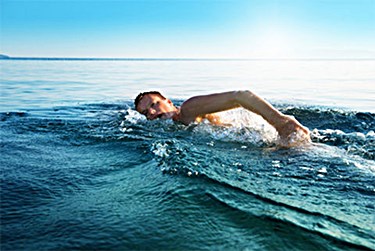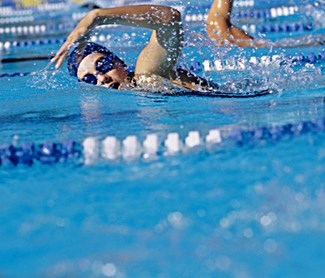Swimming is fun, and it’s good for you. It’s the third most popular sports-related activity among American’s. Sadly, health problems can sometimes get in the way of your plans. Perhaps you’ve woken up to find that you have infectious cold sore blisters and are concerned that you’ll infect other pool users, or if they’ll infect you? Maybe you’re curious as to whether cold sores can be spread by water?
It’s doubtful. Chlorine and other powerful chemicals are added to public swimming pools. These are usually sufficient to kill the herpes simplex virus (HSV-1). This is the virus that causes cold sores, so your open blisters are ‘unlikely’ to infect other swimmers.
You’re also unlikely to become infected by carriers of the virus, even if you’ve had cold sores in the past. Obviously, people who’ve had cold sores once have the virus in their systems for life. Going for a swim at your local pool should be safe for people with a healthy immune system.
If you’re feeling run down, aren’t sleeping well or your hormones are running rampant (pregnancy, menstruation, etc. really ), it may be advisable to wait until you’re feeling 100%. Your immune system will find it harder to fight off HSV-1 if you’ve been weakened in some w just a matter of paying attention to the types of cold sore triggers that could lead to an outbreak.
There are also ‘other’ risks associated with going for a swim. There are inevitably going to be some nasty parasites (such as Cryptosporidium and Giardia) in public pools. These are caused by feces from diapers and other unsanitary habits. If you drank ‘untreated’ water, it could make you ill.
The challenge, just as it is normally, is from contact with areas that haven’t been chemically treated. We’ll now take a closer look at the different factors that you need to consider before you go swimming so that yourself/others can stay healthy.
Is Going Swimming with Cold Sores Safe?
Swimming pools contain chlorine, which kills bacteria and viruses. Although having a cold sore may make you feel uncomfortable, or even embarrassed, you don’t have to stay out of the water. HSV-1 isn’t carried by water, and precautions will have been taken to keep you (and others) safe.
The main problem is that cold sores can easily affect your self-confidence because people are judgmental. And it’s not as if you can cover up a fever blister with a patch or makeup because it’ll come off as soon as you’re exposed to the watery conditions. A waterproof type of makeup could work.
Things aren’t as bad as they might seem. Don’t forget that many of the people in the pool may have had fever blisters – up to 90% of people already have the virus in our systems. If you get weird looks, try not to let that bother you. Just have fun. You know that it can’t spread through water, so allow yourself just to enjoy the experience.
Chlorine and Cold Sores
While chlorine won’t heal cold sores, it won’t make it worse, either. It may burn or sting like it does when it gets in your eyes if your cold sore is at the blistering stage. The chlorine will dry out the blister. Put a petroleum jelly, like Vaseline, on the blister before you enter the pool.
If you forget to put on Vaseline before you go swimming, make sure that you take steps to keep cold sores moist when you’re done. When the blister dries out, it may start to crack. If you haven’t treated it, the virus liquid can come out and spread to another part of your face.
There are different levels of chlorine in private swimming pools relative to public pools. The more chlorine that is added to a pool, the more it will burn. This will help to protect you, but it could make life more uncomfortable.

How to Get Rid of Cold Sores on the Lip
When it is swimming weather, and you get a cold sore on the lip, you should apply a treatment right away. You won’t have to put up with the pain and embarrassment at the pool for long. If you know the symptoms of a cold sore, then you’ll realize that the first sign is the tingling sensation.
That is when you need to apply a treatment, to reduce the number of days that it takes to recover. When applied at an early stage, you can reduce the healing time from around 14 days to just 3 days. An awareness of the triggers and symptoms can make a difference.
- Pro Tip: Consider applying HERP-B-GONE cold sore cream before and after going swimming. It’ll help to kill the virus and prevent it from spreading to healthy skin cells. Read our review or look at customer feedback on Amazon.

How to Prevent Cold Sores
Although there’s no medical cure for the HSV-1 virus, there are things that you can do that will help to prevent cold sores, such as taking Lysine supplements. The suggested dosage when the cold sore is developing, is 1,000 mg, 3 times a day.
To help with the prevention of cold sores, take 50 mg of zinc a day, and 500 mg. of vitamin C. The combination of these vitamins won’t stop a cold sore from developing, but it will reduce the likelihood of getting one. It’ll also keep you healthy.
The HSV-1 virus cannot be spread through water, so you can go swimming with cold sores. The best thing that you can do is use a quality treatment that will minimize the period of suffering, such as HERP-B-GONE cold sore cream or the Virulite Cold Sore Device. If you apply either of these treatments at the first signs of a fever blister, you’ll cut the healing time to a few days. You may be able to prevent an outbreak entirely.
